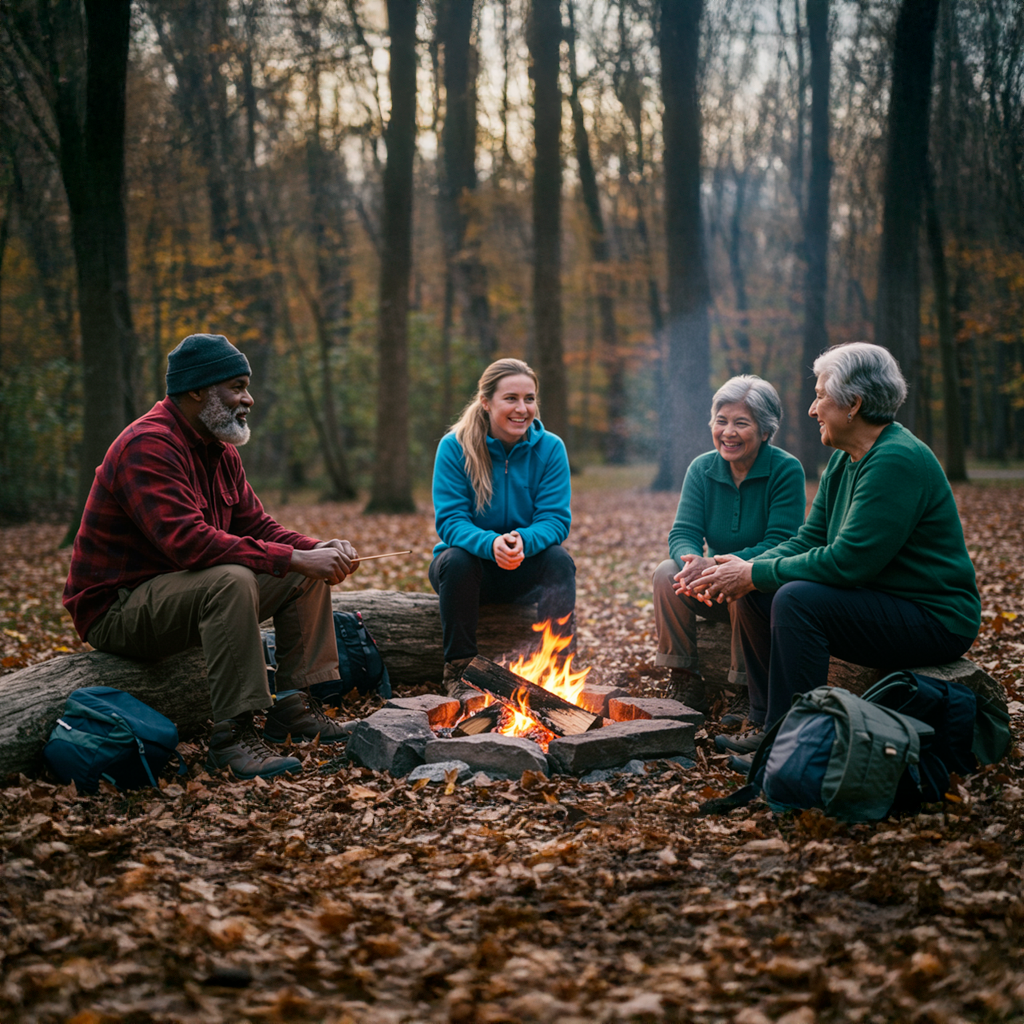They will know you are my disciples if you have love for one another
Trailblazers - Membership Track
Trailblazers is the official membership track for The Crossings Community Church. We are so glad you are considering becoming a part of our church community! This four part series is designed to introduce you to who we are, what we believe, and how you can take your next steps in faith. Whether you are new to The Crossings or have been attending for a while, this journey will help you discover how God is calling you to grow, serve, and belong in our community. We are excited to walk alongside you as we follow Christ together!
Why Church Membership Matters
Being a committed member of a local church is an essential part of the Christian life. In Scripture, believers are called to be more than just attendees—we are part of the body of Christ, each with a role to play (Romans 12:4-5). Membership is a declaration of commitment, not just to a church, but to a shared mission, community, and spiritual growth. It provides a place to serve, encourage, and be encouraged, to be held accountable in our faith, and to walk alongside others as we grow in Christ. At The Crossings, we believe that when we are fully invested in our church family, we experience the richness of true biblical community and make a lasting impact for God’s Kingdom.

Session 1 The Kingdom of God is Here
Big Idea
The Kingdom of God is here and now, and we are called to participate in it. This begins with salvation, followed by baptism, spiritual growth, and engaging in the mission of the church. Our ultimate purpose is to guide people to find and follow Jesus
Bible Study Discussion Guide
Bible Reading
- Romans 3:23 – “For all have sinned and fall short of the glory of God.”
- Romans 6:23 – “For the wages of sin is death, but the gift of God is eternal life in Christ Jesus our Lord.”
- Matthew 28:19-20 – “Go therefore and make disciples of all nations, baptizing them in the name of the Father and of the Son and of the Holy Spirit, teaching them to observe all that I have commanded you.”
Observation Questions
1. What is the significance of the “Romans Road” in understanding salvation, as discussed in the sermon?
2. How does the pastor describe the relationship between salvation and baptism?
3. What are some examples of spiritual gifts mentioned in the sermon, and how are they intended to be used within the church?
4. According to the sermon, what does it mean to live as a Kingdom ambassador in today’s world?
Interpretation Questions
1. How does the concept of the Kingdom of God being a present reality challenge or affirm your current understanding of your faith journey?
2. In what ways does baptism serve as a public declaration of faith, and why is this important for believers?
3. How can discovering and using one’s spiritual gifts contribute to the mission of guiding people to find and follow Jesus?
4. What practical steps can believers take to embody the role of a Kingdom ambassador, especially in a world that may not share their beliefs?
Application Questions
1. Reflect on your personal faith story. How can sharing it with others serve as a testimony of God’s work in your life?
2. If you have not yet been baptized, what steps can you take to make this public declaration of your faith? If you have been baptized, how can you support others in taking this step?
3. Identify one spiritual gift you believe you have. How can you use this gift to serve in a specific ministry within the church?
4. Consider a situation in your life where you can act as a Kingdom ambassador. What actions can you take to bring hope, love, and justice to that situation?
5. How can you make a commitment to live out your faith more boldly and publicly in your daily life? What might be holding you back from doing so?
6. Think of someone in your life who might be open to hearing about your faith journey. How can you initiate a conversation with them this week?
7. What is one area of your life where you feel called to grow in your commitment to Christ? What practical steps can you take to pursue this growth?
Want to talk to us about salvation of being baptized? Use the contact link.
Session 2 What We Believe and Discipleship
Big Idea
Just like every hiker carries essential gear on a journey, every believer has been given gifts to serve and strengthen the church. Being part of the body of Christ isn’t about sitting on the sidelines—it’s about actively using what God has given us to bless others. When we serve, we reflect Jesus, who came not to be served but to serve (Mark 10:45). As Trailblazers, we don’t just walk the path—we help clear the way for others to follow.
Bible Study Discussion Guide
Bible Reading:
- John 17:17 – “Sanctify them in the truth; your word is truth.”
- 2 Timothy 3:14-17 – “But as for you, continue in what you have learned and have firmly believed, knowing from whom you learned it… All Scripture is breathed out by God and profitable for teaching, for reproof, for correction, and for training in righteousness.”
- Ephesians 2:1-10 – “And you were dead in the trespasses and sins in which you once walked… For by grace you have been saved through faith. And this is not your own doing; it is the gift of God.”
—
Observation Questions:
- According to the sermon, what is the significance of objective truth in the context of Christian faith? [07:24]
- How does the sermon describe the role of the Bible in guiding believers? [09:06]
- What are the distinct roles of the Father, the Son, and the Holy Spirit as explained in the sermon? [20:02]
- How does the sermon explain the concept of salvation as a gift of grace?
—
Interpretation Questions:
- In what ways does the sermon suggest that understanding objective truth impacts a believer’s life and faith?
- How does the sermon interpret the relationship between the Old and New Testaments in understanding God’s Word?
- What does the sermon imply about the importance of recognizing our sinful nature and the need for redemption?
- How does the sermon explain the significance of Jesus’ death and resurrection in the context of salvation?
—
Application Questions:
- Reflect on your understanding of objective truth. How does this understanding influence your daily decisions and interactions with others?
- The sermon emphasizes the Bible as the ultimate authority. How can you incorporate more Bible reading and study into your daily routine to strengthen your faith?
- Consider the roles of the Father, Son, and Holy Spirit in your life. How can you be more aware of their presence and guidance in your daily walk?
- The sermon discusses the fall of man and our sinful nature. How can you acknowledge and address areas of sin in your life to grow closer to God?
- Salvation is described as a gift of grace. How can you express gratitude for this gift in your actions and relationships with others?
- The sermon calls for discipleship and evangelism. Identify one person in your life who you can share your faith with this week. What steps will you take to engage them in a spiritual conversation?
- Reflect on the concept of being discipled and discipling others. Who in your life can you seek guidance from, and who can you mentor in their faith journey?
Session 3 Transforming Our Community
Big Idea
Every great journey requires trust—trust in the path, trust in the guide, and trust in the provisions along the way. As followers of Jesus, we are called to walk in faith, trusting God with our time, resources, and future. Generosity isn’t just about giving; it’s about living with an open hand, believing that God will provide and use what we offer to further His Kingdom. When we invest in His mission, we’re not just walking the trail—we’re helping to build it for those who come after us (2 Corinthians 9:6-8).
Bible Study Discussion Guide
Bible Reading
1. Matthew 5:13-16
2. Micah 6:8
3. Colossians 4:2-6
—
Observation Questions
1. In Matthew 5:13-16, what does Jesus mean when He refers to believers as “salt of the earth” and “light of the world”? How does this relate to the sermon’s emphasis on being change-makers in our community?
2. How did the mission trip to Montreal illustrate the concept of being “salt and light” in a practical way?
3. According to Micah 6:8, what are the three things the Lord requires of us? How do these requirements align with the sermon’s call to live missionally?
4. In Colossians 4:2-6, what instructions does Paul give about prayer and speech? How do these instructions support the idea of living missionally and engaging with the community?
—
Interpretation Questions:
1. What does it mean to be a “change-maker” in the context of the sermon, and how does this concept challenge traditional views of church involvement?
2. How can the story of the mission trip to Montreal serve as a model for living out the gospel in our daily lives? What are the key elements that made this mission trip impactful?
3. The sermon emphasizes God’s universal love for all people, regardless of their background. How does this understanding of God’s love influence the way we build relationships with those who are different from us?
4. How does the sermon suggest we balance being prayerful and courageous in our efforts to transform our community? What practical steps can be taken to achieve this balance?
—
Application Questions:
1. Reflect on your current involvement in the community. What is one specific way you can step beyond the church walls to make a tangible difference in someone’s life this week?
2. Identify a person in your workplace, school, or neighborhood who does not know Jesus. What steps can you take to build a genuine relationship with them and share the gospel through your actions?
3. Consider the diversity of people God loves, as mentioned in the sermon. How can you intentionally reach out to someone who is different from you in background or beliefs this week?
4. The sermon encourages us to be prayerful in our daily lives. What is one specific prayer you can incorporate into your daily routine to seek opportunities to serve and share your faith?
5. Think about a local organization or community effort you could join to serve others. What steps will you take this week to get involved and be present in your community?
6. Reflect on a time when you felt hesitant to share your faith story. What can you do to gain the courage to share it with someone this week?
7. The sermon highlights the importance of partnerships in community transformation. How can you collaborate with others in your church or community to extend your reach and effectiveness in serving others?
Session 4 The Church Our Spiritual Family
Big Idea
A true trailblazer doesn’t just walk the path—they make the way clearer for those who follow. As believers, we are called to do the same by sharing the gospel, inviting others into community, and leading by example. The mission of Jesus is not just for us to hold onto but to pass along, guiding others to find and follow Him. When we commit to making disciples, we’re not just walking the trail—we’re expanding it for generations to come (Matthew 28:19-20).
Bible Study Discussion Guide
Bible Reading:
- Romans 12:1-5
- Timothy 3:1-7
- Titus 1:5-9
—
Observation Questions:
1. According to Romans 12:1, what does Paul urge believers to do as an act of worship, and how does this relate to the concept of living sacrifices?
2. In 1 Timothy 3:1-7, what are some of the qualifications listed for someone aspiring to be an elder or overseer in the church?
3. How does the sermon describe the difference between the “big C” Church and the “little c” church?
4. What role does church discipline play in maintaining the integrity and spiritual health of the church, according to the sermon?
—
Interpretation Questions:
1. How does viewing oneself as a living sacrifice change a believer’s perspective on their role within the church community?
2. Why is it important for church leaders to meet the qualifications outlined in 1 Timothy 3, and how does this impact the congregation’s trust in their leadership?
3. What are the potential consequences of approaching church with a consumer mindset rather than one of service and mission?
4. How does the concept of church discipline, as discussed in the sermon, align with the teachings in Titus 1:5-9?
—
Application Questions:
1. Reflect on your current involvement in your local church. Are there areas where you might be approaching church with a consumer mindset? How can you shift towards a mindset of service and mission?
2. Consider the qualifications for church leaders in 1 Timothy 3. How can you support and pray for your church leaders to uphold these standards?
3. Think about the concept of living as a holy sacrifice. What specific steps can you take this week to prioritize holiness over personal happiness in your daily life?
4. How can you actively contribute to the unity and accountability within your church community? Are there specific actions you can take to protect the church’s unity?
5. Church discipline is a sensitive topic. How can you approach situations that require discipline with love and authority, as suggested in the sermon?
6. Identify one way you can serve in your local church this month. What specific ministry or area can you contribute to, and how will you take the first step?
7. Reflect on the sermon’s emphasis on supporting the church through faithful attendance and giving. What changes can you make to ensure you are consistently supporting your church community?
Session 5 Wrap-Up & Q&A
Big Idea
Being a member of The Crossings Community Church means understanding what we believe, how we live out our faith, and how we hold each other accountable in love. This final session is an open conversation between Justin and Phil, reviewing the key teachings from the series and answering any lingering questions about membership, service, church discipline, and more.
Bible Study Discussion Guide
Bible Reading:
1. Matthew 6:10 – “Your kingdom come, your will be done, on earth as it is in heaven.”
2. 1 Corinthians 12:4-7 – “There are different kinds of gifts, but the same Spirit distributes them. There are different kinds of service, but the same Lord. There are different kinds of working, but in all of them and in everyone it is the same God at work.”
3. Ephesians 4:11-13 – “So Christ himself gave the apostles, the prophets, the evangelists, the pastors and teachers, to equip his people for works of service, so that the body of Christ may be built up until we all reach unity in the faith and in the knowledge of the Son of God and become mature, attaining to the whole measure of the fullness of Christ.”
—
Observation Questions:
1. What does the sermon suggest about the nature of God’s kingdom and its presence on earth?
2. How are spiritual gifts described in the sermon, and what is their purpose within the church?
3. What is the process for becoming a member of the church, according to the sermon?
4. How does the church ensure doctrinal purity and accountability among its leaders and members?
—
Interpretation Questions:
1. How does the concept of God’s kingdom being a present reality on earth influence the way believers should live their daily lives? [00:20]
2. In what ways can spiritual gifts be misused, and how can they be redirected to serve God’s purpose according to the sermon? [02:00]
3. Why is it important for church members to understand and agree with core doctrinal beliefs, and how does this safeguard the church? [20:11]
4. What role does the congregation play in maintaining accountability within the church’s leadership structure? [37:40]
—
Application Questions:
1. Reflect on your own spiritual gifts. How can you use them more effectively to serve your church community?
2. Consider the talents you have. How can you align them with God’s purpose to glorify Him in your daily life?
3. What steps can you take to deepen your understanding of the church’s core beliefs and ensure you are aligned with them?
4. How can you actively participate in maintaining doctrinal purity and accountability within your church?
5. Think about the concept of God’s kingdom on earth. What practical actions can you take this week to manifest this kingdom in your community?
6. If you are not yet a member, what might be holding you back from committing to church membership, and how can you address these concerns?
7. How can you support the church’s mission to plant new churches and focus on community and discipleship?
Spotify Trailblazers Playlist
To accompany this series, we’ve created a Trailblazers Audio Playlist on Spotify! 🎧 This playlist features the audio recordings of each week’s message, allowing you to listen on the go, whether you’re commuting, working, or just taking a moment to reflect. Catch up on any sessions you missed or revisit key teachings to deepen your understanding. Check it out and stay connected to the heart of the Trailblazers series!







